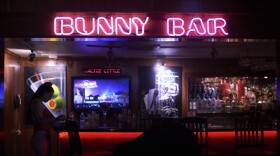I’m at one of the few places in Nevada where you’re not likely to find a local: The Las Vegas Strip. And I’ve got a quiz for the tourists here.
“Where are you from?” I ask.
“Sherwood Park, Alberta,” a couple of men reply.
“True or False: Prostitution is legal in Las Vegas.”
“True.”
It’s not. It’s not legal in Clark County. In fact, the nearest brothel is in Pahrump, an hours drive away.
Yet just down the street, a woman is handing out cards with nude women on them to visitors, advertising escorts… to well... *hang out* with you. It’s legal to hire these women to accompany you, but when it comes to paying them for sex, that crosses the line, legally.
Confusing, right?
Rebekah Charleston agrees.
She said this was something her pimp forced her into while they were in Vegas. Her lawyer, Jason Guinasso, claims by allowing legal brothels to exist, the state is violating the federal Mann Act, which prohibits interstate travel for “immoral purposes”--like prostitution. The industry, Charleston argues, attracts illegal traffickers to the state.
“I believe Nevada is a sex tourism state,” Charleston said. “I think so many people operate under the misconception. Especially with the tagline, ‘what happens here stays here.’ I mean, it almost encourages that kind of behavior.”
Charleston’s trafficker first forced her into prostitution when she was a homeless teen in Texas.
“I still have flashbacks. And I can feel my brain sloshing back and forth like it used to when he hit me,” Charleston said. “You know, you can’t even explain it without having gone through something similar and understanding the dynamics.”
Years later, in the early 2000s, she was trafficked to Nevada, which she said has a huge customer base. And sometimes, her trafficker would send her and the other women he was trafficking to brothels.
“If we were getting arrested too much in a city, or if we weren’t making enough money, our trafficker would actually send us to legal brothels in Nevada as a form of punishment and control,” Charleston said.
Charleston said this went on without the brothel’s knowledge.
“Traffickers are skilled at staying behind the scenes, you know?” Charleston said. “Our trafficker put everything in our names. I mean, they knew how to evade detection.”
Multiple brothel owners claim no one is ever trafficked into the brothels. Each worker has to complete an FBI check, which the brothel owners said would prevent trafficking.
Since last year, Reno Lawyer Jason Guinasso has been a vocal opponent of legal prostitution. He’s attempted to ban brothels in multiple Nevada counties through ballot questions and petitions, though those attempts have failed.
“I think there’s a reluctance of men… especially men who are willing to buy sex,” Guinasso said. “There’s a reluctance to understand the humanity of the person on the other side of the transaction from them.”
But now, he’s taking a different approach. He is representing Rebekah Charleston and two others in a federal lawsuit against the state of Nevada, which has requested the suit be dismissed. The women all said they were trafficked in Nevada, and Guinasso argues because brothels are legal here, that industry attracts more illicit behavior to the state.
But brothel owners say their businesses actually help fight trafficking, and keep workers safe because clients use mandatory condoms and there are various onsite security measures.
Bella Cummins is the owner of Bella’s Hacienda in Wells.
She thinks there needs to be a stronger cultural distinction between what goes on under the grip of a pimp and what happens at a licensed establishment. And that starts with the vocabulary we generally use as a society.
“Right now everything is linked under one ‘p’ word, which is prostitution,” Cummins said. “And that word really has nothing to do with identifying legal sex services, that I like to call sensual services. [It’s] got a lot more to do with being a therapist.”
Storey County Commissioner Lance Gilman is another brothel owner. His business is the Mustang Ranch just east of Reno. He’s taking a straight legal approach by adding himself as a defendant to the federal lawsuit that anti-brothel lawyer Jason Guinasso filed against the state. Gilman said going to this extent isn’t about him, it’s about the women.
“The reason the ladies come to legal brothels primarily is because they are safer,” Gilman said. “If they are on the illegal side of the industry, in any city in the nation… and they’re there everywhere… there’s really no safety from the predators.”
Along with joining the suit, Gilman hired a public relations company for the first time to help educate the public about what he said happens at the brothels and has held an open house for media to see his ranch.
While Gilman wants to add transparency to normalize sex work, Guinasso said that could be dangerous. Growing up here, Guinasso remembered how some of his friends would have encounters at brothels arranged by their fathers for their 18th birthdays, like a rite of passage.
“That was something young men bragged about and talked about. You laugh, you joke,” Guinasso said. “You don’t take it very seriously because in a teenager’s mind, I don’t think that there’s a connection between the state of the law and the humanity.”
Whether brothels encourage trafficking or prevent it, it’s going to be up to the courts to decide if Nevada’s brothel system will be preserved.






